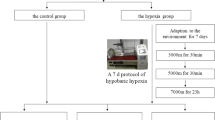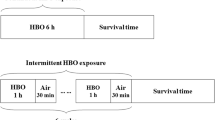Abstract
Despite its rare occurrence, humans and animals have been prone to getting fast developing severe hypobaric hypoxia. Understanding the redox homeostasis related response of an aging heart to this type of hypoxia are crucially important, since the metabolism of myocardial tissue depends on the redox status of proteins. Rodents can tolerate hypoxic stress better than human subjects. This study was aimed at investigating the effects of fast developing severe hypobaric hypoxia on redox status biomarkers; such as, advanced oxidation protein products (AOPP), lipid hydroperoxides (LHPs), protein carbonyl groups (PCO), protein thiol groups (P-SH), and total thiol groups (T-SH) on the myocardial left ventricles of young and aged Wistar rats. The rats were gradually ascended and exposed to an 8000-meter hypobaric hypoxia. While AOPP levels showed no difference, the TSH and PSH concentrations decreased, and the PCO and LHP increased in both of the hypoxic groups than the controls. The TSH and PSH were lower, and AOPP, PCO and LHP were found to be higher in the elderly hypoxic groups than in the young ones. The significant outcome of the study represents that an 8000-meter hypobaric hypoxia could be considered as a severe hypoxic stress, but not life-treating for the rats and would affect both the young and aged left ventricles similarly in respect to impaired redox status. However, if the percentage increases are taken into consideration, it seems that the higher rate of protein oxidation occurs in young hearts; meanwhile aged hearts are more prone to T-SH oxidation.


Similar content being viewed by others
References
Air Accident Investigation Aviation Safety Board A (2006) Aircraft accident report helios airways flight HCY522 BOEING 737–31S at Grammatiko, Hellas on 14 August 2005. 11 - 2006. https://www.academia.edu/29376872/HELIOS_Airways_Flight_HCY522_Boeing_737-31S_A_Technical_Report. Accessed 25 Feb 2019
Albright J (2015) Recognizing and preventing slow-onset hypoxia. Bus Commer Aviat (BCA) 12:63–66. https://aviationweek.com/business-businessaviation/recognizing-and-preventing-slow-onset-hypoxia. Accessed 14 Mar 2019
Alderman C, Shah S, Foreman J, Chain B, Katz D (2002) The role of advanced oxidation protein products in regulation of dendritic cell function. Free Radic Biol Med 32(5):377–385. https://doi.org/10.1016/S0891-5849(01)00735-3
Andriollo Sanchez M, Hininger-Favier I, Meunier N, Venneria E, O’Connor J, Maiani G, Coudray C, Roussel A (2005) Age-related oxidative stress and antioxidant parameters in middle-aged and older. European subjects: the ZENITH study. Eur J Clin Nutr 59(2):58–62. https://doi.org/10.1038/sj.ejcn.1602300
Badr-el-din N, Noaman E, Fattah S, Ghoneum M (2010) Reversal of age-associated oxidative stress in rats by MRN-100, a hydro-ferrate fluid. In Vivo 24(4):525–534
Bailey D, Castell L, Newsholme E, Davies B (2000) Continuous and intermittent exposure to the hypoxia of altitude: implications for glutamine metabolism and exercise performance. Br J Sports Med 34:210–212. https://doi.org/10.1136/bjsm.34.3.210
Bradford M (1976) A rapid sensitive method for the quantitation of microgram quantities of protein utilizing the principle of protein dye binding. Anal Biochem 72:248–254. https://doi.org/10.1016/0003-2697(76)90527-3
Çakatay U, Telci A, Yilmaz İ, Akçay T, Sivas A (2000) Yaşlanmanın plazma oksidatif protein hasarına etkisi. Cerrahpaşa Tıp Derg 31:220–223
Çakatay U, Telci A, Kayalı R, Tekeli F, Akçay T, Sivas A (2001) Relation of oxidative protein damage and nitrotyrosine levels in the aging rat brain. Exp Gerontol 36(2):221–229. https://doi.org/10.1016/s0531-5565(00)00197-2
Çakatay U, Telci A, Kayalı R, Tekeli F, Akçay T, Sivas A (2003) Relation of aging with oxidative protein damage parameters in the rat skeletal muscle. Clin Biochem 36(1):51–55. https://doi.org/10.1016/s0009-9120(02)00407-1
Çakatay U, Kayali R, Uzun H (2008) Relation of plasma protein oxidation parameters and paraoxonase activity in the ageing population. Clin Exp Med 8(1):51–57. https://doi.org/10.1007/s10238-008-0156-0
Carrick-Ranson G, Hastings JL, Bhella PS, Shibata S, Fujimoto N, Palmer MD, Boyd K, Levine BD (2012) Effect of healthy aging on left ventricular relaxation and diastolic suction. Am J Physiol Heart Circ Physiol 303(3):H315–H322. https://doi.org/10.1152/ajpheart.00142.2012
Cebe T, Yanar K, Atukeren P, Ozan T, Kuruç AI, Kunbaz A, Sitar ME, Mengi M, Aydın MŞ, Eşrefoğlu M, Aydın S, Çakatay U (2014) A comprehensive study of myocardial redox homeostasisin naturally and mimetically aged rats. AGE 36(6):1–14. https://doi.org/10.1007/s11357-014-9728-y
Chris B (Writer) (2014) SpaceX's CRS-4 Dragon completes Tuesday arrival at ISS: NASA spaceflight.com. https://www.nasaspaceflight.com/2014/09/crs-4-dragon-tuesday-iss-arrival/. Accessed 20 Mar 2019
Clarke C (2006) Acute mountain sickness: medical problems associated with acute and subacute exposure to hypobaric hypoxia. Postgrad Med J 82(973):748–753. https://doi.org/10.1136/pgmj.2006.047662
Dalle-Donne I, Rossi R, Giustarini D, Milzani A, Colombo R (2003) Protein carbonyl groups as biomarkers of oxidative stress. Clin Chim Acta 329(1–2):23–38. https://doi.org/10.1016/s0009-8981(03)00003-2
Devi S, Vani R, Subramanyam MV, Reddy S, Jeevaratnam K (2007) Intermittent hypobaric hypoxia-induced oxidative stress in rat erythrocytes: protective effects of vitamin E, vitamin C, and carnitine. Cell Biochem Funct 25(2):221–231. https://doi.org/10.1002/cbf.1344
Dewi S, Mulyawan W, Wanandi SI, Sadikin M (2018) The effect of intermittent hypobaric hypoxia on oxidative stress status and antioxidant enzymes activity in rat brain. Acta Biochim Indones 1(2):46–51
Dringen R, Gutterer JM, Hirrlinger J (2000) Glutathione metabolism in brain metabolic interaction between astrocytes and neurons in the defense against reactive oxygen species. Eur J Biochem 267(16):4912–4916. https://doi.org/10.1046/j.1432-1327.2000.01597.x
Du J, Gebicki J (2004) Proteins are major initial targets of hydroxyl free radicals. Int J Biochem Cell Biol 36(11):2334–2343. https://doi.org/10.1016/j.biocel.2004.05.012
Dupré R, Owen T (1992) Behavioral thermoregulation by hypoxic rats. J Exp Zool 262(2):230–235. https://doi.org/10.1002/jez.1402620213
Eaton P (2006) Protein thiol oxidation in health and disease: techniques for measuring disulfides and related modifications in complex protein mixtures. Free Radic Biol Med 40(11):1889–1899. https://doi.org/10.1016/j.freeradbiomed.2005.12.037
Eaton P, Wright N, Hearse D, Shattock M (2002) Glyceraldehyde phosphate dehydrogenase oxidation during cardiac ischemia and reperfusion. J Mol Cell Cardiol 34(11):1549–1560. https://doi.org/10.1006/jmcc.2002.2108
Gianni P, Jan K, Douglas M, Stuarta P, Tarnopolsky M (2004) Oxidative stress and the mitochondrial theory of aging in human skeletal muscle. Exp Gerontol 39(9):1391–1400. https://doi.org/10.1016/j.exger.2004.06.002
Gordon CJ, Fogelson L (1991) Comparative effects of hypoxia on behavioral thermoregulation in rats, hamsters, and mice. Am J Physiol 260(1 Pt 2):R120–R125. https://doi.org/10.1152/ajpregu.1991.260.1.R120
Hanasand M, Omdal R, Norheim K, Gøransson L, Brede C, Jonsson G (2012) Improved detection of advanced oxidation protein products in plasma. Clin Chim Acta 413(9–10):901–906. https://doi.org/10.1016/j.cca.2012.01.038
Hollingsworth KG, Blamire AM, Keavney BD, Macgowan GA (2012) Left ventricular torsion, energetics, and diastolic function in normal human aging. Am J Physiol Heart Circ Physiol 302(4):H885–H892. https://doi.org/10.1152/ajpheart.00985.2011
Höpfl G, Ogunshola O, Gassmann M (2003) Hypoxia and high altitude. The molecular response. Adv Exp Med Biol 543:89–115. https://doi.org/10.1007/978-1-4419-8997-0_7
Kalousová M, Zima T, Tesař V, Dusilová-Sulková S, Škrha J (2005) Advanced glycoxidation end products in chronic diseases-clinical chemistry and genetic background. Mutat Res, Fundam Mol Mech Mutagen 579(1–2):37–46. https://doi.org/10.1016/j.mrfmmm.2005.03.024
Magalhães J, Ascensão A, Soares J, Ferreira R, Neuparth M, Marques F, Duarte J (2005) Acute and severe hypobaric hypoxia increases oxidative stress and impairs mitochondrial function in mouse skeletal muscle. J Appl Physiol 99(4):1247–1253. https://doi.org/10.1152/japplphysiol.01324.2004
Mansfield KD, Simon MC, Keith B (2004) Hypoxic reduction in cellular glutathione levels requires mitochondrial reactive oxygen species. J Appl Physiol 97(4):1358–1366. https://doi.org/10.1152/japplphysiol.00449.2004
Matés J, Pérez-Gómez C, Castro INd, Asenjo M, Márquez J (2002) Glutamine and its relationship with intracellular redox status, oxidative stress and cell proliferation/death. Int J Biochem Cell Biol 34(5):439–458. https://doi.org/10.1016/s1357-2725(01)00143-1
Murray A (2009) Metabolic adaptation of skeletal muscle to high altitude hypoxia: how new technologies could resolve the controversies. Genome Med 1(12):117–126. https://doi.org/10.1186/gm117
Parati G, Giuliano A, Bilo G, Torlasco C (2014) Highcare projects: high altitude cardiovascular research. OGM - Scientific Publishing, Services & Communication, Milano. http://www.cairimini.it/wp-content/uploads/2016/05/Highcare_book.-11-yrs-of-high-altitude-research.pdf. Accessed 22 Mar 2019
Pialoux V, Mounier R, Ponsot E, Rock E, Mazur A, Dufour S, Richard R, Richalet J, Coudert J, Fellmann N (2006) Effects of exercise and training in hypoxia on antioxidant/pro-oxidant balance. Eur J Clin Nutr 60(12):1345–1354. https://doi.org/10.1038/sj.ejcn.1602462
Radák Z, Asano K, Lee K, Ohno H, Nakamura A, Nakamoto H, Goto S (1997) High altitude training ıncreases reactive carbonyl derivatives but not lipid peroxidation in skeletal muscle of rats. Free Radic Biol Med 22(6):1109–1114. https://doi.org/10.1016/s0891-5849(96)00350-4
Reznick AZ, Packer L (1994) [38] Oxidative damage to proteins: spectrophotometric method for carbonyl assay. Methods Enzymol 233:357–363. https://doi.org/10.1016/S0076-6879(94)33041-7
Sedlak J, Lindsay R (1968) Estimation of total, protein bound, and non-protein sulfhydryl groups in tissue with Ellman’s reagent. Anal Biochem 25(1):192–205. https://doi.org/10.1016/0003-2697(68)90092-4
Silva TDO, Jung IE, Moresco RN, Barbisan F, Ribeiro EE, Ribeiro EA, Motta K, Britto E, Tasch E, Bochi G, Duarte MMMF, Oliveira ARD, Marcon M, Beló C, Montagner GFDS, Cruz D (2014) Association between advanced oxidation protein products and 5-year mortality risk among amazon riparian elderly population. Free Radic Res 49(2):204–209. https://doi.org/10.3109/10715762.2014.992895
Simsek B, Yanar K, Kansu A, Belce A, Aydin S, Çakatay U (2019) Caloric restriction improves the redox homeostasisin the aging male rat heart even when started inmiddle-adulthood and when the body weight is stable. Biogerontology 20:127–140. https://doi.org/10.1007/s10522-018-9781-5
Smita K, Qadar-Pasha M, Jain S (2015) Oxidative stress and histopathological evaluation of rat lung tissue during hypobaric hypoxia. J Proteom Bioinform 8(6):108–115. https://doi.org/10.4172/jpb.1000358
Solaini G, Harris D (2005) Biochemical dysfunction in heart mitochondria exposed to ischaemia and reperfusion. Biochem J 1(390):377–394. https://doi.org/10.1042/BJ20042006
Stadtman E (2004) Role of oxidant species in aging. Curr Med Chem 11(9):1105–1112. https://doi.org/10.2174/0929867043365341
Stadtman E, Levine R (2000) Protein oxidation. Ann N Y Acad Sci 899:191–208
The Boeing Company (2016) Boing 737-800 flight crew operation manual. The Boeing Company, Seattle Washington. http://www.737flightsimulator.co.uk/737info/B737OM.pdf. Accessed 15 Feb 2019
Thurber M (Producer) (2010) Study: pilots ıgnore oxygen regulations. Business Aviation. https://www.ainonline.com/aviation-news/aviation-international-news/2010-01-26. Accessed 13 Feb 2019
Udayabanu M, Kumaran D, Nair RU, Srinivas P, Bhagat N, Aneja R, Katyal A (2008) Nitric oxide associated with iNOS expression inhibits acetylcholinesterase activity and induces memory impairment during acute hypobaric hypoxia. Brain Res 1230:138–149. https://doi.org/10.1016/j.brainres.2008.06.081
Virués-Ortega J, Garrido E, Javierre O, Kloezeman K (2006) Human behavior and development under high-altitude conditions. Dev Sci 9(4):400–410. https://doi.org/10.1111/j.1467-7687.2006.00505.x
Wilson M, Newman H, Imray C (2009) The cerebral effects of ascent to high altitudes. Lancet Neurol 8(2):175–791. https://doi.org/10.1016/s1474-4422(09)70014-6
Wolff S (1994) Ferrous ion oxidation in presence of ferric ion indicator xylenol orange for measurement of hydroperoxides. Methods Enzymol 233:182–189. https://doi.org/10.1016/s0076-6879(94)33021-2
Yıldırım E, İpek E, Bavunoğlu I, Yıldırım N, Cengiz M, Yavuzer S, Yavuzer H, Erman H, Uzun H (2017) The impact of protein oxidation on sustained and white coat hypertension. Anatol J Cardiol 17(3):210–216
Zeng J, Zhong Z, Li X, Wu Q, Zheng S, Zhou J, Ye W, Xie F, Wu X, Huang Z, Chen J (2014) Advanced oxidation protein products accelerate bone deterioration in aged rats. Exp Gerontol 50:64–71. https://doi.org/10.1016/j.exger.2013.11.014
Acknowledgements
The authors thank Prof. Dr. Metin Baştuğ and Prof. Dr. Hakan Fıçıcılar of the Physiology Department from Ankara University, Faculty of Medicine, for their contribution and technical support. The authors also thank Rudolf Peter Jelen from Çankaya University, Department of Foreign Languages, English Preparatory Unit, for his editorial contributions.
Author information
Authors and Affiliations
Corresponding author
Ethics declarations
Conflict of interest
The authors declare that there is no conflict of interest.
Additional information
Publisher's Note
Springer Nature remains neutral with regard to jurisdictional claims in published maps and institutional affiliations.
Rights and permissions
About this article
Cite this article
Ağaşcıoğlu, E., Çolak, R., Demirel, H. et al. Impaired redox homeostasis in the heart left ventricles of aged rats experiencing fast-developing severe hypobaric hypoxia. Biogerontology 20, 711–722 (2019). https://doi.org/10.1007/s10522-019-09826-1
Received:
Accepted:
Published:
Issue Date:
DOI: https://doi.org/10.1007/s10522-019-09826-1




